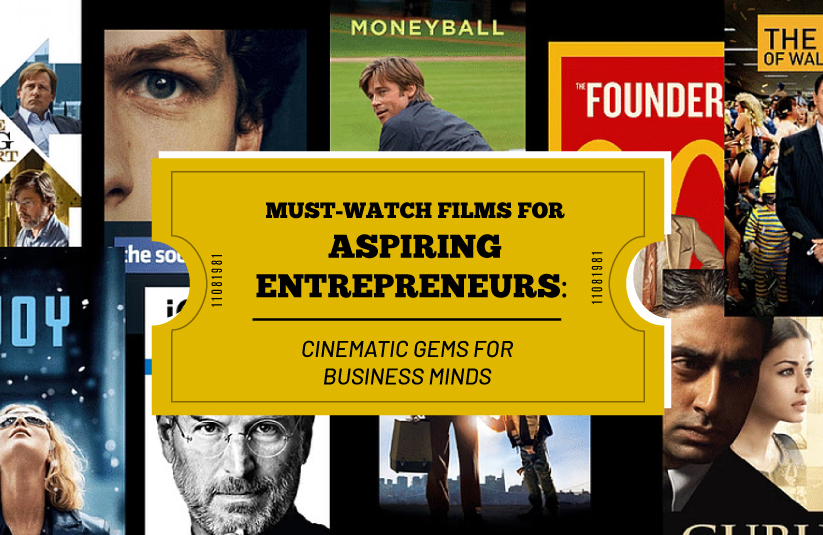Stories of aspiration, achievement, and failure in movies frequently reflect the struggles and victories faced by company owners. Filmmakers have used a wide range of tales to examine the intricacies of entrepreneurship, from the boardrooms of Silicon Valley to the Wall Street trading floors. We explore carefully chosen movies in this blog that provide insightful analysis and important takeaways for future corporate executives. These films offer a multitude of information and motivation for those who are navigating their entrepreneurial path by illuminating the tactics, ethical issues, and difficulties that arise in the business world through engaging storytelling and interesting characters.
The Social Network (2010) – Directed by David Fincher:
This film chronicles the founding of Facebook by Mark Zuckerberg and his tumultuous journey from college student to tech billionaire. Key lessons include the importance of innovation, perseverance, and adaptability in the ever-changing landscape of technology and entrepreneurship.
The Pursuit of Happyness (2006) – Directed by Gabriele Muccino:
Based on the true story of Chris Gardner, this film follows his journey from homelessness to successful stockbroker. It emphasizes the power of resilience, determination, and unwavering belief in oneself, even in the face of seemingly insurmountable odds.
Moneyball (2011) – Directed by Bennett Miller:
This film explores the transformative power of data-driven decision-making in the world of professional sports. Business leaders can learn valuable lessons about the importance of analytics, innovation, and thinking outside the box to gain a competitive edge in their respective industries.
The Big Short (2015) – Directed by Adam McKay:
A riveting account of the 2008 financial crisis, this film sheds light on the complexities of the financial markets and the risks of unchecked greed and speculation. Business professionals can learn about the importance of risk management, due diligence, and ethical decision-making in navigating volatile markets.
The Wolf of Wall Street (2013) – Directed by Martin Scorsese:
This film offers a cautionary tale of excess and moral bankruptcy in the world of finance. While it may glamorize the high-flying lifestyle of Wall Street brokers, it also serves as a stark reminder of the consequences of unethical behavior, fraud, and manipulation in business.
Steve Jobs (2015) – Directed by Danny Boyle:
A biographical drama depicting the life of Apple co-founder Steve Jobs, this film offers insights into the visionary leadership, innovation, and relentless pursuit of excellence that defined Jobs’ approach to business. Entrepreneurs can learn about the importance of passion, creativity, and disruptive thinking in driving success.
Office Space (1999) – Directed by Mike Judge:
A satirical comedy set in a mundane corporate office environment, this film highlights the frustrations and absurdities of modern workplace culture. Business leaders can learn about the importance of employee engagement, workplace satisfaction, and fostering a positive company culture to drive productivity and innovation.
Chef (2014) – Directed by Jon Favreau:
In this heartwarming movie, a gifted chef pursues his love of cooking on his own terms by leaving the constraints of a conventional restaurant kitchen. In order to pursue their entrepreneurial endeavors, entrepreneurs may understand the value of being passionate about what they do, accepting innovation, and taking measured risks.
Nightcrawler (2014) – Directed by Dan Gilroy:
The film “Nightcrawler” presents a frightening vision of the competitive freelance journalist industry and the moral dilemmas associated with sensationalist reporting. Viewers see the extent people will go to in order to succeed in their undertakings as protagonist Lou Bloom negotiates the ethically dubious world of crime journalism. The movie emphasizes the value of making moral decisions and the fallout when ambition takes precedence over integrity in the workplace.
Boiler Room (2000) – Directed by Ben Younger:
“Boiler Room” offers a peek inside the high-stakes world of stock trading houses and the attraction of quick money through dubious means. The experiences of the main character, Seth Davis, provide viewers with insight into the perils of greed and the moral conundrums that people in the financial business face. The movie is a warning on the value of moral behavior and the dangers of sacrificing one’s morals in order to pursue financial success.
Tucker: The Man and His Dream (1988) – Directed by Francis Ford Coppola:
“Tucker: The Man and His Dream” narrates the genuine tale of Preston Tucker, a forward-thinking businessman who dared to question the established norms in the automotive sector. Tucker has encountered many challenges and disappointments, but he is unwavering in his goal of creating a ground-breaking vehicle that puts safety and innovation first. The movie honors the spirit of entrepreneurship, tenacity, and resolve needed to break long-standing markets and realize lofty concepts.
Glengarry Glen Ross (1992) – Directed by James Foley:
“Glengarry Glen Ross” explores the brutal rivalry among salespeople striving for success as well as the high-stress world of real estate sales. The movie tackles issues of ambition, desperation, and moral compromise in the chase of professional achievement through a number of compelling interactions and heated confrontations. Watchers see the ethical challenges that people have while under pressure to hit sales goals and succeed financially at all costs.
Joy (2015) – Directed by David O. Russell:
“Joy” tells the inspirational story of businesswoman Joy Mangano’s struggle through hardship to create a prosperous enterprise. The movie emphasizes the value of tenacity and inventiveness in conquering challenges and achieving entrepreneurial goals via Joy’s fortitude, inventiveness, and unrelenting resolve. Joy’s story of success as an entrepreneur is proof of the transformational power of perseverance, passion, and creativity in creating successful businesses.
Conclusion:
In conclusion, dedicated company owners may find a wealth of stories on the silver screen that speak to them and give insightful knowledge, motivation, and inspiring experiences. Every movie presents a different angle on the struggles and victories of business, from the creative vision of Steve Jobs to the sobering tales of excess told in The Wolf of Wall Street. Aspiring corporate executives may learn important lessons about strategy, innovation, leadership, and ethics by watching these film stories and considering the difficulties that their characters encounter. In the end, the knowledge gained from these movies may enable company owners to successfully and meaningfully create their companies by guiding them through the difficulties of the business world with fortitude, inventiveness, and honesty.













